
Shocking Blue was a Dutch rock band formed in The Hague in 1967. They were part of the Nederbeat movement in the Netherlands. The band had a string of hit songs during the counterculture movement of the 1960s and early 1970s, including "Send Me a Postcard" and "Venus", which became their biggest hit and reached number one on the U.S. Billboard Hot 100 and many other countries during 1969 and 1970. The band sold 13.5 million records by 1973 but disbanded in 1974. Together with Golden Earring they are considered the most successful Nederbeat-band, if the criterion is scoring hits abroad and especially in the United States.

"Seasons in the Sun" is an English-language adaptation of the 1961 Belgian song "Le Moribond" by singer-songwriter Jacques Brel with lyrics rewritten in 1963 by American singer-poet Rod McKuen portraying a dying man's farewell to his loved ones. It became a worldwide hit in 1974 for Canadian singer Terry Jacks and became a Christmas number one in the UK in 1999 for Westlife.

Roland Kent LaVoie, better known by his stage name Lobo, is an American singer-songwriter who was successful in the 1970s, scoring several U.S. Top 10 hits including "Me and You and a Dog Named Boo", "I'd Love You to Want Me", and "Don't Expect Me to Be Your Friend". These three songs, along with "Where Were You When I Was Falling in Love", gave Lobo four chart toppers on the Easy Listening/Hot Adult Contemporary chart.
"Always on My Mind" is a ballad written by Wayne Carson, Johnny Christopher, and Mark James, first recorded by Brenda Lee and first released by Gwen McCrae in March 1972. Lee's version was released three months later in June 1972. The song has been a crossover hit, charting in both the country and western and pop categories. Elvis Presley's recording was the first commercially successful version of the song.
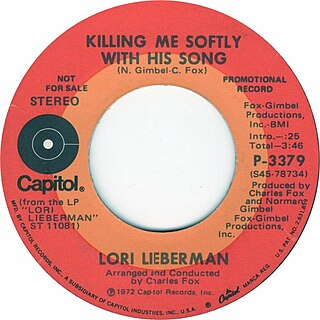
"Killing Me Softly with His Song" is a song composed by Charles Fox with lyrics by Norman Gimbel. The lyrics were written in collaboration with Lori Lieberman after she was inspired by a Don McLean performance in late 1971. Denied writing credit by Fox and Gimbel, Lieberman released her version of the song in 1972, but it did not chart. The song has been covered by many other artists.

"When a Man Loves a Woman" is a song written by Calvin Lewis and Andrew Wright and first recorded by Percy Sledge in 1966 at Norala Sound Studio in Sheffield, Alabama. It made number one on both the Billboard Hot 100 and R&B singles charts. Country singer John Wesley Ryles had a minor hit with his version of the song in 1976 while singer and actress Bette Midler recorded the song 14 years later and had a Top 40 hit with her version in 1990. In 1991, Michael Bolton recorded the song and his version peaked at number one on both the Billboard Hot 100 chart and the Billboard Adult Contemporary Singles chart.

"The First Time Ever I Saw Your Face" is a 1957 folk song written by British political singer-songwriter Ewan MacColl for Peggy Seeger, who later became his wife. At the time, the couple were lovers, although MacColl was still married to his second wife, Jean Newlove. Seeger sang the song when the duo performed in folk clubs around Britain. During the 1960s, it was recorded by various folk singers and became a major international hit for Roberta Flack in 1972, winning Grammy Awards for Record of the Year and Song of the Year. Billboard ranked it as the number-one Hot 100 single of the year for 1972.

"If You Don't Know Me by Now" is a song written by Kenny Gamble and Leon Huff, and recorded by the Philadelphia soul musical group Harold Melvin & the Blue Notes. It became their first hit after being released as a single in September 1972, topping the US R&B chart and peaking at number 3 on the US Billboard Hot 100.
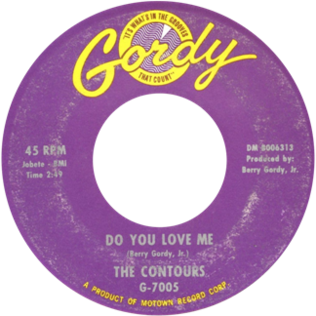
"Do You Love Me" is a rhythm and blues song recorded by the Contours in 1962. Written and produced by Motown Records owner Berry Gordy Jr., it appeared twice on the Billboard Hot 100 chart, reaching numbers three in 1962 and eleven in 1988.

"Do You Really Want to Hurt Me" is a song written and performed by English new wave band Culture Club. Released as a single in September 1982 from the group's platinum-selling debut album, Kissing to Be Clever (1982), it was the band's first UK No. 1 hit. In the United States, the single was released in November 1982 and also became a hit, reaching No. 2 for three weeks.
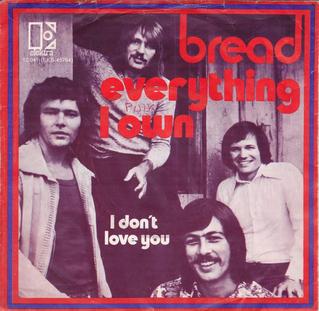
"Everything I Own" is a song written by American singer-songwriter David Gates. It was originally recorded by Gates's soft rock band Bread for their 1972 album Baby I'm-a Want You. The original reached No. 5 on the American Billboard Hot 100. Billboard ranked it as the No. 52 song for 1972. "Everything I Own" also reached No. 5 in Canada and No. 1 in the Philippines.
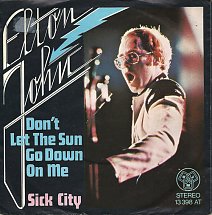
"Don't Let the Sun Go Down on Me" is a song written by English musician Elton John and songwriter Bernie Taupin. It was originally recorded by John for his eighth studio album, Caribou (1974), and was released as a single that peaked at number two on the Billboard Hot 100 chart, and reached number 16 on the UK Singles Chart.

"I Won't Last a Day Without You" is a song by The Carpenters with lyrics written by Paul Williams and music composed by Roger Nichols. It was released in the U.K. in September 1972, paired with "Goodbye to Love" as a double-A side. The single reached No. 9 and spent 14 weeks on the chart. It was later released in the U.S. and became a hit single for them in 1974, reaching No. 11 on the Billboard Hot 100 chart and number one on the easy listening chart. It was the Carpenters' ninth No. 1 on the easy listening chart.
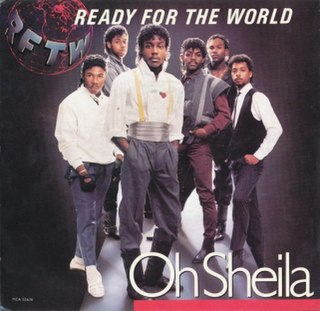
"Oh Sheila" is a song by American R&B band Ready for the World. Released as a single in 1985, it reached number one on the US Billboard Hot 100, the Billboard Hot Black Singles chart, and the Billboard Hot Dance/Disco Club Play chart. It was the first of two chart toppers for the band on the Billboard R&B chart, preceding their 1986 number-one R&B hit, "Love You Down".
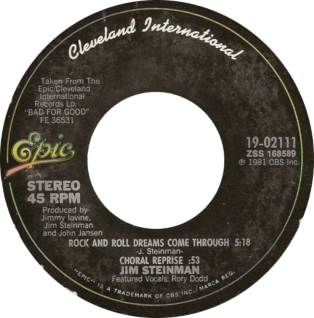
"Rock and Roll Dreams Come Through" is a song written by American composer Jim Steinman. It was first featured on Steinman's 1981 solo album Bad for Good, with lead vocals by an uncredited Rory Dodd. It was later recorded by American singer Meat Loaf and released in 1994 as the third single from the album Bat Out of Hell II: Back into Hell.

"Me and You and a Dog Named Boo" is the 1971 debut single by Lobo. Written by Lobo under his real name Kent LaVoie, it appears on the Introducing Lobo album.

"The Greatest Love of All" is a song written by Michael Masser, who composed the music, and Linda Creed, who wrote the lyrics. It was originally recorded in 1977 by George Benson, who made the song a substantial hit, peaking at number two on the US Hot Soul Singles chart that year, the first R&B chart top-ten hit for Arista Records. The song was written and recorded to be the main theme of the 1977 film The Greatest, a biopic of the boxer Muhammad Ali, and is performed during the opening credits.

"How Do You Do" released in 1971 was an international hit single for Dutch duo Mouth & MacNeal. It was #1 in the Netherlands, Belgium, Denmark, Switzerland, and New Zealand. It also spent 19 weeks in the Billboard Hot 100 a year later, reaching #8 and a cover version by Scots-German duo Die Windows reached #1 in Germany. The single earned Mouth & MacNeal, and its composers Hans van Hemert and Harry van Hoof, the 1972 Buma Export Award for the most records sold abroad by a Dutch musical act in that year.

Of a Simple Man is the second album by Lobo, released in 1972 on Big Tree Records.
"Let Me Down Easy" is a song first originally written and recorded by American singer–songwriter Lobo. The track first appeared on his 1972 album titled, Of a Simple Man. In 1977, it was recorded by American Christian and country singer Cristy Lane. It was released as a single via LS Records and became Lane's first major hit in the country music field. The song helped establish her career and would later be released on the 1977's Cristy Lane Is the Name. It received a positive response from writers and critics.


















